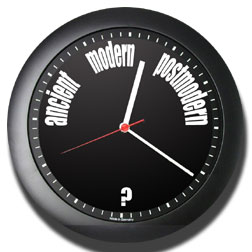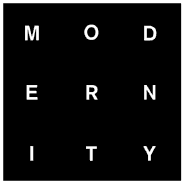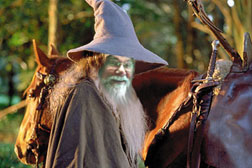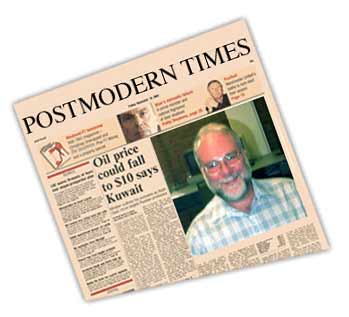...thoughts expressed here are not necessarily final.
May 03, 2004 More poMo ponderings
Smoking is one of the leading causes of statistics.
I mentioned recently that I am wearying of the modern-postmodern
church debate.
As I have been listening to a variety of voices, reclarification of my
thoughts on the whole debate may be in order. I am not against change,
and I am not against engaging the culture. I think the arguments for change
have degraded into cliches and oversimplifications that have lost the
keen edge they require to see any progress toward real change. I am not
weary of asking questions about the role of the church in the world. I
am not weary of challenges to the status quo way of doing church in the
West. I am weary of rehashing the same old formal paradigms over and over
that never seem to me to be the real issues.
 |
I agree that we need a new reformation. The first one recaptured the idea of Sola Scriptura as the way Sovereign God has communicated His essence and how we are to relate to Him. What I see in word and deed so many occasions of postmodern debate is a call to reform our way of relating that truth to the culture, to become culturally relevant and throw off the modern bonds and structures that hamstring us. |
Brian Mclaren has asked whether the church has anything fresh and incisive to say. I respond that the living word is ever fresh- supernaturally so. It is living and active and still separates between bone and marrow 20 centuries after it was completed. It has been asked whether there is a new C. S. Lewis or a Francis Schaeffer in the evangelical community of Christ to challenge and bring fresh insight to the church. Saints Clive and Francis would be the first to say that they were not in the business of saying something new for their generation. They successfully articulated the historic faith in ways the modern mind could engage with and be influenced.
| Lewis was all about
restating ancient orthodoxy in a compelling way. He owed part of this
ability to the fact that he did not smell like seminary. He was not
original in his doctrine- the forms he utilize to communicate them
were based in what he gained from a mind engaged in the art of literary
criticism. He spoke at times in comparison- what we look like versus
what a New Testament Christian looked like historically. |
 |
McLaren asked in A New Kind of Christian "Has the
'good news' been reduced to the 'good same-old same-old'?"
I say the “good news” has been recast as the pursuit of the
“good self”. The Biblical gospel IS the same – and that
is precisely what postmoderns I know are looking for- something bigger
than them to organize their life around – to find the center. Only
Christ and the work he completed at the cross can afford that to the needy
generations we live among. The great challenge in the west is to see the
fallacy of consumer based Christianity - McChurch as some have called
it is really another aspect of the transmodern propensity of man to make
himself the center of the universe. To become a faceless follower of Christ
is like becoming part of the Borg collective in the modern mind. Moderns
do not want to become assimilated. Instead we become more interested in
buying into or selling ideas and forms that will grab and engage our wandering
minds for a moment. Like the airheads at the Areopagus that Paul engaged
who were always "spending their time in nothing but telling or hearing
something new” we are culture driven by distraction TO distraction.
 |
The postmodern mind might propose that the analysis of any situation cannot bear the weight of truth because it is informed by too many perspectives. The Christian answer is that there is but one perspective that matters- that of the creator Lord who speaks. I would like to compare and contrast some ideas from our cultural milieu with what God hath said. |
Self Actualization versus Self Crucifixion
The problem has at its radix an anthropological question - what is the
nature of man? The problem with man has at the root the nature of sin,
not just cultural shifts; of depravity, not modernity or post modernity.
Sin is transmodal. The Bible reckons time in terms such as the beginning,
or as the “end times”- that period of time of sojourning between
the first and second advent of Jesus Christ. Modernity was always a presumption
at best that was based on reaction of basic sin in new and creative forms.
If form follows function, then the issues that we must deal with are functional
ones with a view to perfect change. This is exactly the biblical approach.
In Romans 6-12 Paul exhorts us to reckon the reality of Who God has revealed
himself to be and allow ourselves to be conformed to that reality.
| The notion of salvation in our day has degraded into the idea of coming to terms with your past and your destiny. As such salvation has been subsumed by self actualization. This is a key idea to all I want to say here. If our salvation experience is one of self aggrandizement it is not biblical salvation. |  |
The only exaltation we know is in , of, through, to,
and of Christ. That is precisely what I see missing so often in the modern-poMo
debate. Micah 6: 8 says God requires us to do justice, love mercy and
walk humbly before our God. That is only possible for fallen man in the
context of the Christ life. We are not Just apart from Him, we cannot
fathom mercy outside of His definition, there is no humility apart from
the crucified life. These ideas owe themselves to a proper understanding
of the Word of God given by the regenerating light of the Spirit.
Autonomy versus Community
"The unhappiest people I know these days,"writes transcendental
travel writer Pico Iyer in The Global Soul, "are often the ones in
motion, encouraged to search for a utopia outside themselves." Iyer
has dubbed these people as “nowherians”- restless, rootless
and often fruitless in their search for a sense of home in a fragmented
and hurried world has led to a peculiar form of alienation. Though he
tracks this phenomenon of the 21st century with great accuracy and even
brilliance, he is unable to offer a solution for the aching malaise afflicting
these global souls, whom he describes as "full-time citizens of nowhere."
 |
This problem is two tiered- as modernism declined the legacy of autonomy and individuality- human traits- that it championed remained. The existing sources of modern community- family, church and other organizations languished as they became less relevant to the instant gratification and speed culture that moderns developed a taste for. |
So I find my self agreeing in spirit with some of the
flavors the McLaren’s writings leave in my mouth. McLaren’s
journey is one away from and counter to established forms. I have often
been a champion of alternative forms in subjection to the primacy of the
Word in life. At its worst the modern church’s penchant for codifying
and charting and packaging eternal truths into easily digestible pills
has engendered an attitude among the faithful that this is indeed possible.
That necessarily means that the easy answers they embrace buckle when
tested. Ergo we have a wheat and tares scenario in the western church
where people have “accepted Jesus Christ as their personal savior”
or acknowledged that” God loves them and has a wonderful plan for
their life” and yet not biblically “believed and received”
the truth of the gospel unto transforming, saving faith.
The idea of categories is suspect among postmodern writers- the need to
twist things to make them fit into neat boxes is undeniably wrong. But
let it be said that God ordains categorization by means of his creative
activities in the world and in his word. It seems to me that God likes
lists. At least the Holy Spirit did not make the biblical writers to shun
them. McLaren himself tends towards a dualism- new is good, old is bad
– in his writings and this in itself sort of defeats his stated purpose.
| Consider this quote- “Remember, modernity only wants abstract principles, universal concepts, and disembodied absolutes … all truth is contextual.” -that is an absolute statement itself. |  |
Voices in the emerging church warn against the ingrouping
and outgrouping effect of modern religion. But the church itself is an
ark- a place of separation from the world and exclusivity in its claims
to be the agency of redemption in the world. Postmodernism offers a kind
of tribalism as the alternative.
But form and technique is not the issue- form and technique are always
to be subservient to human interaction and only frame a context within
which to work. Technique is not a modern construct. Formulae reduce technique
to something inauthentic- there is no one size fits all answer to the
mysterious God who is there and speaks. We apprehend him but we will never
comprehend him. We can never substitute learning a new technique to the
data-devastating transformational experience of knowing and following
the living Jesus.
Reality Checking through Worship
 |
Modernism’s unwitting attack against the transcendent spawned a culture in rebellion against accepted notions of reality because it just didn’t work. It is obvious to humans that there is more to life than the pragmatic things we see. |
The first reformation started with a systematic, propositonal
95 theses nailed to the door of authority. The finished work of Christ
was completed with the nailing of the living Word of God to a cross. A
new reformation may well be based on a spiritual nailing of relational
concepts that promote a return to the cross as a antithetical way of life
in a corporeal society to the hearts of a lost world.
We need to see ourselves in terms of a collective again as it was meant
to be- what the allelon and koinonia passages attest to. We need to understand
that it is not evolution but conformation that real change is based upon.
There are no latent human abilities that can be nurtured to fulfill what
God intended to do through us supernaturally. We may need to rethink the
processes by which we prescriptively develop a definable Christian World
View and heed instead the application of transcendent scriptural truth
that will necessarily look foolish to the world. We will move from being
a “people of the book” to having the Word of God written on
our hearts and minds. Then we will be less interested in spiritual questing
than in resting in the arms of the redeemer.
 |
Me as the Grey wizard??Or presuming to be premodern? |
 |